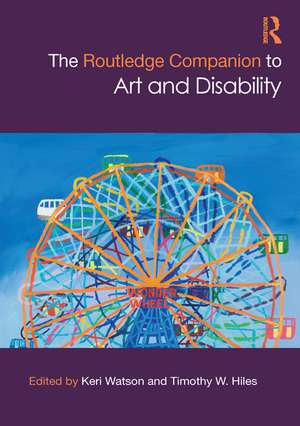The Routledge Companion to Art and Disability: Routledge Art History and Visual Studies Companions
Editat de Keri Watson, Timothy W. Hilesen Limba Engleză Paperback – 27 mai 2024
This companion is organized thematically and includes artists from across historical periods and cultures in order to demonstrate the ways in which disability is historically and culturally contingent. The book engages with questions such as: How are people with disabilities represented in art? How are notions of disability articulated in relation to ideas of normality, hybridity, and anomaly? How do artists use visual culture to affirm or subvert notions of the normative body? Contributors consider the changing role of disability in visual culture, the place of representations in society, and the ways in which disability studies engages with and critiques intersectional notions of gender, race, ethnicity, class, and sexuality.
This book will be particularly useful for scholars in art history, disability studies, visual culture, and museum studies.
Din seria Routledge Art History and Visual Studies Companions
-
 Preț: 383.57 lei
Preț: 383.57 lei -
 Preț: 365.51 lei
Preț: 365.51 lei - 9%
 Preț: 1490.08 lei
Preț: 1490.08 lei - 9%
 Preț: 1491.83 lei
Preț: 1491.83 lei - 9%
 Preț: 1591.52 lei
Preț: 1591.52 lei -
 Preț: 469.97 lei
Preț: 469.97 lei -
 Preț: 308.75 lei
Preț: 308.75 lei -
 Preț: 352.56 lei
Preț: 352.56 lei - 16%
 Preț: 220.06 lei
Preț: 220.06 lei -
 Preț: 457.37 lei
Preț: 457.37 lei - 11%
 Preț: 301.91 lei
Preț: 301.91 lei - 34%
 Preț: 1221.16 lei
Preț: 1221.16 lei - 9%
 Preț: 320.99 lei
Preț: 320.99 lei -
 Preț: 443.02 lei
Preț: 443.02 lei -
 Preț: 405.97 lei
Preț: 405.97 lei - 11%
 Preț: 309.10 lei
Preț: 309.10 lei - 11%
 Preț: 309.28 lei
Preț: 309.28 lei - 25%
 Preț: 1139.88 lei
Preț: 1139.88 lei - 25%
 Preț: 1250.81 lei
Preț: 1250.81 lei - 10%
 Preț: 329.71 lei
Preț: 329.71 lei - 14%
 Preț: 284.83 lei
Preț: 284.83 lei - 28%
 Preț: 1261.61 lei
Preț: 1261.61 lei - 28%
 Preț: 1267.72 lei
Preț: 1267.72 lei - 28%
 Preț: 1253.69 lei
Preț: 1253.69 lei -
 Preț: 334.43 lei
Preț: 334.43 lei -
 Preț: 353.40 lei
Preț: 353.40 lei - 30%
 Preț: 1224.20 lei
Preț: 1224.20 lei - 30%
 Preț: 1221.91 lei
Preț: 1221.91 lei - 9%
 Preț: 1592.61 lei
Preț: 1592.61 lei
Preț: 352.31 lei
Nou
Puncte Express: 528
Preț estimativ în valută:
67.42€ • 72.09$ • 56.21£
67.42€ • 72.09$ • 56.21£
Carte tipărită la comandă
Livrare economică 17 aprilie-01 mai
Preluare comenzi: 021 569.72.76
Specificații
ISBN-13: 9781032225944
ISBN-10: 1032225947
Pagini: 464
Ilustrații: 198
Dimensiuni: 174 x 246 x 29 mm
Greutate: 0.76 kg
Ediția:1
Editura: Taylor & Francis
Colecția Routledge
Seria Routledge Art History and Visual Studies Companions
Locul publicării:Oxford, United Kingdom
ISBN-10: 1032225947
Pagini: 464
Ilustrații: 198
Dimensiuni: 174 x 246 x 29 mm
Greutate: 0.76 kg
Ediția:1
Editura: Taylor & Francis
Colecția Routledge
Seria Routledge Art History and Visual Studies Companions
Locul publicării:Oxford, United Kingdom
Public țintă
Postgraduate and UndergraduateNotă biografică
Keri Watson is Associate Professor of Art History at the University of Central Florida
Timothy W. Hiles is Associate Professor of Art History and Associate Director of the School of Art at the University of Tennessee.
Timothy W. Hiles is Associate Professor of Art History and Associate Director of the School of Art at the University of Tennessee.
Cuprins
Part 1 Historical and Religious Framings of Art and Disability 1. Valdivia Statuettes and Hybridity in the Americas of 3500–2500 BCE: An Indigenous Critical Disability Perspective 2. Madness in Classical Greek Art 3. Blindness from Antiquity to the Early Modern Era and its Depiction in Art 4. Bodies of Difference: Disability and Otherness in the Twelfth-Century Japanese Yamai no sōshi 5. Disability in Ancient Indian Art and Aesthetic Theory: The Case of Bibhatsa and Bhayanaka Rasas 6. Ability and Disability in the Pictorial Vitae of Beata Fina in Fifteenth-Century San Gimignano 7. Disability, the Body, and Geopolitics: Lam Qua’s Nineteenth-Century Portraits 8. Art History’s Co-Inhabitants: Disabled Artistic Approaches to Indigeneity Part 2 Ableism and Disablism: Constructing Notions of Idealized Bodies 9. The Afflicted Body of Job and the Aesthetic of Wholeness in Gothic Sculpture 10. Able-bodied and Disabled Dwarfs in Italian Renaissance Art and Culture 11. The Broken Body as Devotional Mediator in Seventeenth-Century Spain 12. Charles Lang Freer: Collecting the Disabled Body 13. Exercising "Disciplinary Power": The "Compulsory Visibility" of Lewis Hine’s 1917 Photographs of Laboring-Class Teen Women with Scoliosis 14. Eternal Youth: Fascism, Eugenics, and the Ideal Body at Rockefeller Center’s Palazzo d’Italia 15. Masculinity and Disability in the Franklin Delano Roosevelt Memorial 16. Pieces of Cake Part 3 Towards an Aesthetics of Disability 17. Blinding Sight: Vision and Spectacles in John Haberle’s Trompe l’Oeil Paintings 18. On Not Seeing or Feeling: Embodying Disability in Viennese Modern Art 19. Fragmented Bodies: Ideal Beauty and Deformity in Nineteenth-Century Art and Science 20. The Aesthetics of Prosthetics: From the Premodern Uncanny to the Postmodern Imaginary 21. Introducing Crip Materiality: Mad Objects and Soft Screw 22. Sign Language Music Videos: Language Preservation or Appropriation? 23. Grow Your Brain! Contemporary Art on the Autism Spectrum
Recenzii
"Aimed at scholars and students of museum studies[...]it covers a remarkable range of different topics and also geographical locations, and time periods. If you are interested in disability studies and you're into art in a wide variety of forms then you should have a look at this book." -Jenny Mathiasson, The Conservators' Podcast
Descriere
The Routledge Companion to Art and Disability explores disability in visual culture to uncover the ways in which bodily and cognitive differences are articulated physically and theoretically, and to demonstrate the ways in which disability is culturally constructed.
